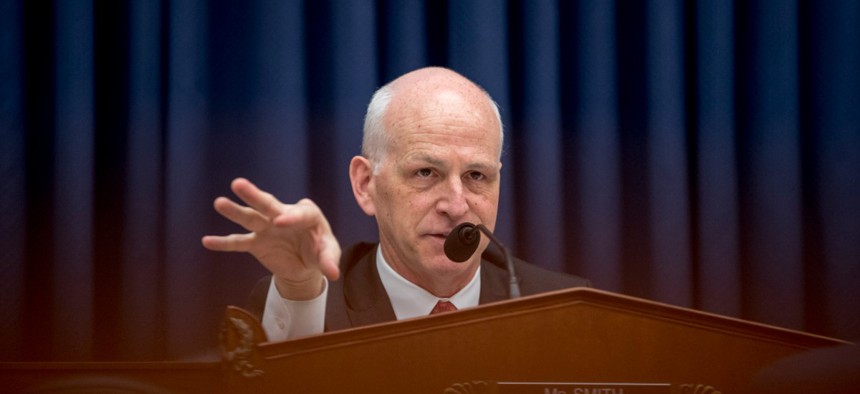HASC Chair on Mini-Nukes: ‘We’re Not Trying to Manage a Nuclear War’
hairman Adam Smith, D-Wash., speaks as Secretary of the Army Mark Esper, U.S. Army Chief of Staff Gen. Mark Milley, Secretary of the Air Force Heather Wilson, and U.S. Air Force Chief of Staff Gen. David Goldfein. Tuesday, April 2, 2019.
A week after beating back a Republican effort to restore funding for a new low-yield nuclear warhead, the chairman of the House Armed Services Committee said he doesn’t buy the Pentagon’s notion that having a smaller nuke would help avoid defeat in certain war scenarios.
“We are not trying to figure out how to manage a nuclear war," Rep. Adam Smith, D-Washington, said Wednesday at National Defense University’s Countering WMD conference.
Smith spoke just hours before the House passed a $923 billion spending bill that includes the 2020 defense authorization act — and no funding for the W76-2 warhead. But the issue is likely to be a sticking point when House Democrats meet Senate Republicans to hammer out a final version of the spending bill.
Pentagon strategists say the W76-2, mounted atop a submarine-launched ballistic missile, is needed to counter a Russian doctrine called “escalate to de-escalate.” The scenario runs something like this: Moscow starts a conflict — say, on the Polish-Lithuanian border between Russia’s Kaliningrad exclave and its ally Belarus — and NATO and the United States respond with overwhelming conventional force. Russia, then, drops one of its estimated 2,500 small nuclear bombs on the battlefield, and the United States, unwilling to use one of its far larger nuclear weapons, backs off.
But if the United States had a small nuke of its own, Russia might not go down that path, Gen. Paul Selva, the vice chairman of the Joint Chiefs of Staff, said in April. At the least, Selva said, the United States would have a way to better manage a nuclear conflict.
“A limited number of low-yield nuclear weapons provides the president with an option where we can say, ‘If the Russians attacked us with a low-yield nuclear weapon, we have an option to reply in kind that is inherently de-escalatory and stabilizing,’” the general said.
It’s one reason why they play a big role in the Pentagon’s 2018 Nuclear Posture Review, the military’s strategy document for nuclear deterrence.
In his remarks, Smith took issue with the idea that the United States would be constrained in its response to a nuclear attack, even with a smaller nuclear weapon.
The HASC chairman took pains to say that he’s hardly against the Pentagon’s plan to modernize its nuclear arsenal. His committee’s markup of the defense authorization act fully funded the requests for the B-21 stealth bomber and Columbia-class ballistic missile submarine.
Arms-control expert Kingston Reif agreed in a Twitter exchange with Defense One. “Inexplicably, the 2018 Nuclear Posture Review fails to cite an intelligence assessment demonstrating that Russia might believe the United States would be self-deterred from using the weapons in its current arsenal (including higher-yield nuclear or conventional weapons) in response to a limited Russian nuclear attack,” said Reif, who directs Disarmament and Threat Reduction Policy at the Arms Control Association.
The House bill also strips out money for studies into next-generation missile interception concepts, such as space-based lasers and particle beams to destroy missiles on the launch pad. The Pentagon is hoping to study the concepts but Smith said that no missile defense technology would "stop sophisticated missiles from coming in” — and therefore, he has no interest in funding them and that is why strengthening conventional deterrence was so important.
Nuclear weapons are one of several big sticking points that House Democrats and Senate Republicans will have to hammer out in conference before Congress can pass the final 2020 spending bills. Smith said that the other items are the budget topline, what to do with the prison at Guantanamo, funding for the border wall, and hundreds of individual provisions for spending increases. He said that the path to reconciling the House version of the bill and the Senate version of the same bill would be “difficult but not impossible.”




